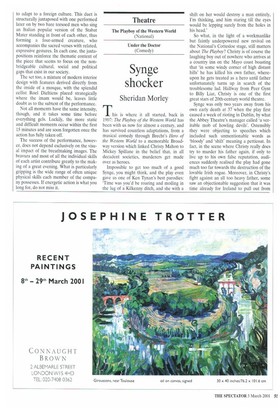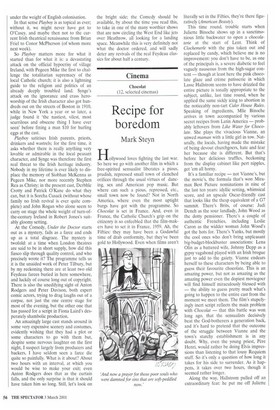Theatre
The Playboy of the Western World (National) Under the Doctor (Comedy)
Synge shocker
Sheridan Morley
This is where it all started, back in 1907: The Playboy of the Western World has been with us now for almost a century, and has survived countless adaptations, from a musical comedy through Brecht's Hero of the Western World to a memorable Broadway version which linked Christy Mahon to Mickey Spillane in the belief that, in all decadent societies, murderers get made over as heroes.
Impossible to get too much of a good Synge, you might think, and the play even gave us one of Ken Tynan's best parodies: 'Time was you'd be roaring and moiling in the lug of a Kilkenny ditch, and she with a shift on her would destroy a man entirely, I'm thinking, and him staring till the eyes would be lepping surely from the holes in his head.'
So what, in the light of a workmanlike but faintly underpowered new revival on the National's Cottesloe stage, still matters about The Playboy? Christy is of course the laughing boy out of nowhere who arrives at a country inn on the Mayo coast boasting that 'in some windy corner of high distant hills' he has killed his own father, whereupon he gets treated as a hero until father unfortunately turns up in search of the troublesome lad. Halfway from Peer Gynt to Billy Liar, Christy is one of the first great stars of 20th-century world theatre.
Synge was only two years away from his own early death at 37 when the play first caused a week of rioting in Dublin, by what the Abbey Theatre's manager called 'a veritable mob of howling devils'. Ostensibly they were objecting to speeches which included such unmentionable words as 'bloody' and 'shift' meaning a petticoat. In fact, in the scene where Christy really does try to murder his father again, if only to live up to his own false reputation, audiences suddenly realised the play had gone much too far towards the destruction of the lovable Irish rogue. Moreover, in Christy's fight against an all too heavy father, some saw an objectionable suggestion that it was time already for Ireland to pull out from under the weight of English colonisation.
In that sense Playboy is as topical as ever; without it, we might never have got to O'Casey, and maybe then not to the current Irish theatrical renaissance from Brian Friel to Conor McPherson (of whom more next week).
So Playboy matters more for what it started than for what it is: a devastating attack on the official hypocrisy of village Ireland, with Pegeen Mike the first to challenge the totalitarian supremacy of the local Catholic church; it is also a lightning guide to the religion and politics of an already deeply troubled land. Synge's attack on the ignorance and crass heroworship of the Irish character also got hundreds out on the streets of Boston in 1910, while in New York a year or so later, a judge found it 'the nastiest, vilest, most scurrilous and obscene thing I have ever seen' before fining a man $10 for hurling eggs at the cast.
Playboy satirises Irish parents, priests, drinkers and wastrels; for the first time, it asks whether there is really anything very lovable or admirable in the local peasant character, and Synge was therefore the first real threat to the Irish heritage industry. Nobody in my lifetime is ever likely to displace the memory of Siobhan McKenna as Pegeen Mike, nor more recently Stephen Rea as Christy; in the present cast, Derbhle Crotty and Patrick O'Kane do what they can, but it is Sorcha Cusack (without whose family no Irish revival is ever quite complete) and John Rogan who alone seem to carry on stage the whole weight of turn-ofthe-century Ireland in Robert Jones's suitably gloomy setting.
At the Comedy, Under the Doctor starts out as a mystery, fails as a farce and ends up as a total disgrace. The mystery is twofold: at a time when London theatres are said to be in short supply, how did this fiasco slip through quality control, and who precisely wrote it? The programme tells us it is the unaided work of Peter Tilbury, but by my reckoning there are at least two old Feydeau farces buried in here somewhere, and luckily of course long out of copyright. There is also the unedifying sight of Anton Rodgers and Peter Davison, both expert comic actors, trying to drag laughs out of a corpse, not just the one centre stage for most of the evening, but the other one that has passed for a script in Fiona Laird's desperately shambolic production.
An amazingly large cast stands around in some very expensive scenery and costumes, evidently wishing that they had a plot or some characters to go with them but, despite some nervous laughter on the first night, I suspect largely from producers and backers, I have seldom seen a farce die quite so painfully. What is it about? About two hours with an interval, at which you would be wise to make your exit; even Anton Rodgers does that as the curtain falls, and the only surprise is that it should have taken him so long. Still, let's look on the bright side; the Comedy should be available, by about the time you read this, to take in one of the many worthier shows that are now circling the West End like jets over Heathrow, all looking for a landing space. Meanwhile this is very definitely not what the doctor ordered, and will sadly deter any revivals of the real Feydeau classics for about half a century.













































































 Previous page
Previous page